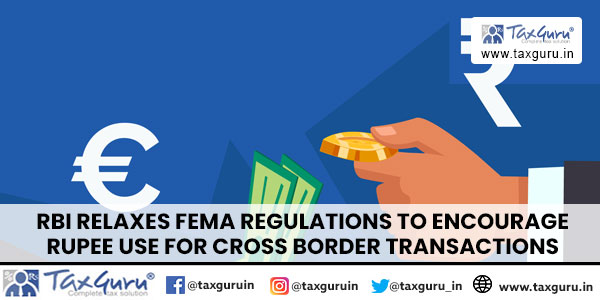The Reserve Bank of India (RBI) has introduced a series of regulatory amendments to encourage the use of the Indian Rupee in cross-border transactions. These changes, notified through various amendments to the Foreign Exchange Management Act (FEMA), aim to simplify foreign exchange practices, provide greater clarity, and promote ease of doing business in India. Here is an overview of the key amendments:
Notification No. FEMA 10(R)(5)/2025-RB; Dated: 14.01.2025
The RBI now permits exporters in India to open and maintain Foreign Currency Accounts with banks outside the country. These accounts can serve multiple purposes:

1. Receiving Export Payments: Exporters can use these accounts to receive full export value and advance remittances related to the export of goods or services.
2. Utilizing Funds: The funds deposited in these accounts can be utilized for paying import bills into India or repatriated to India within a specified period, which is by the end of the subsequent month.
3. Compliance Assurance: Repatriations must align with existing regulations on the export of goods and services.
This regulatory update is expected to simplify export-related transactions, offering Indian exporters greater flexibility while ensuring adherence to foreign exchange norms.
Foreign Exchange Management (Deposit) (Fifth Amendment) Regulations, 2025
Notification No. FEMA 5(R)(5)/2025-RB; Dated: 14.01.2025
Significant changes have been made to the management of repatriable Rupee accounts and Special Non-Resident Rupee (SNRR) Accounts:
1. Fund Transfers: Explicit permission is granted for transferring funds between repatriable Rupee accounts within India for all bona fide transactions.
2. SNRR Account Usage:
-
- Non-residents with business interests in India can open SNRR accounts with authorized dealers in India or their branches abroad. These accounts facilitate permissible transactions with both residents and non-residents.
- Units in International Financial Services Centres (IFSC) can open SNRR accounts for business transactions related to activities outside the IFSC.
3. Terminology Updates: To enhance clarity, terms like “Indian bank” are replaced with “a bank” in relevant sections.
4. Account Tenure Alignment: The tenure of SNRR accounts now corresponds to the duration of the underlying contract or business operation.
5. Location-Specific Clarifications: Additional phrases like “in India” and “having the SNRR account in India” are incorporated to eliminate ambiguities regarding the account’s location.
These refinements aim to streamline foreign fund management and ensure clarity in the operation and regulation of SNRR accounts.
Notification No. FEMA 395(3)/2025-RB; Dated: 14.01.2025
The amendments introduce updated provisions for payments, investments, and reporting concerning non-debt instruments. Key highlights include:
1. Revised Payment Modes: Investments in equity instruments, foreign portfolio investments, limited liability partnerships (LLPs), foreign venture capital, and investment vehicles must follow updated payment methods. These include inward remittances through banking channels or funds from repatriable foreign currency or Rupee accounts.
2. Investment-Specific Guidelines:
-
- Equity Instruments (Schedule I): Payments must be made through banking channels or repatriable accounts, with a 60-day issuance timeline for equity
- Foreign Portfolio Investors (Schedule II): Payments and sale proceeds can be managed through foreign currency or SNRR accounts.
- LLPs (Schedule VI): Capital contributions and disinvestment proceeds must adhere to remittance or repatriable account guidelines.
- Foreign Venture Capital Investors (Schedule VII): Similar provisions apply to payments and proceeds.
- Investment Vehicles (Schedule VIII): Payments and sale proceeds can be managed via inward remittance or repatriable accounts.
- Indian Depository Receipts (Schedule X): NRIs/OCIs can invest using NRE/FCNR accounts, while FPIs can use foreign currency or SNRR accounts.
3. Convertible Notes for Start-ups: Start-ups issuing convertible notes to foreign residents can receive payments through inward remittance or repatriable accounts. Repayments follow similar channels.
4. Clarification on Banking Channels: “Banking channels” now explicitly include Rupee Vostro accounts, including Special Rupee Vostro Accounts.
These regulatory updates reflect the RBI’s commitment to fostering a more flexible and transparent foreign exchange framework, enhancing India’s appeal as a global business destination.





